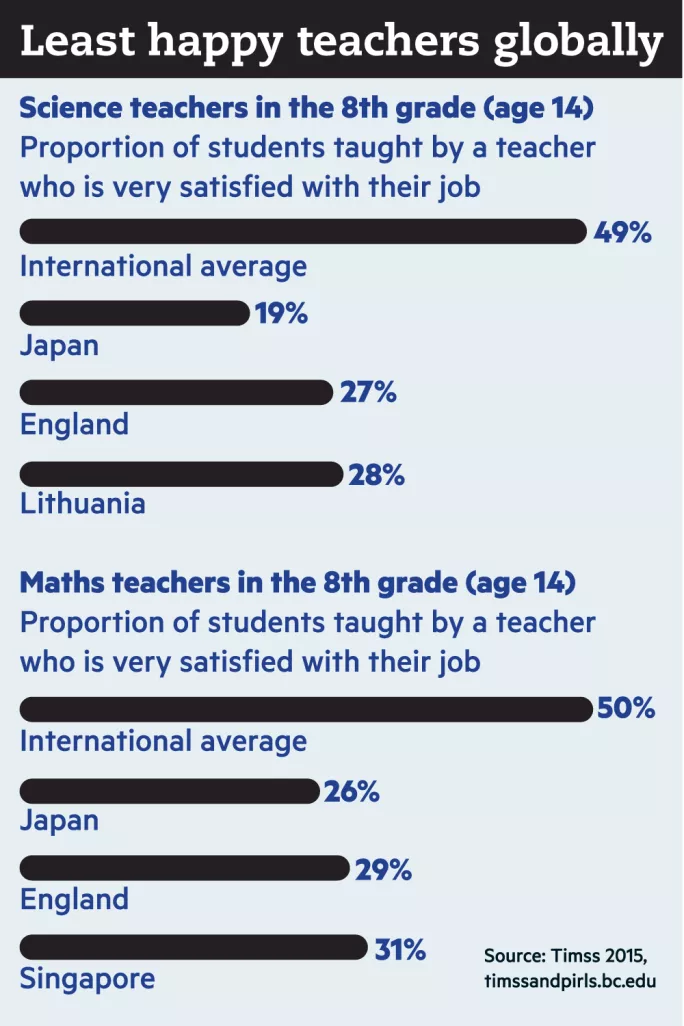Maths and science teachers among world’s unhappiest

Maths and science teachers in England are among the least happy with their jobs in the world, according to new international data.
England comes second to last in tables ranking teacher job satisfaction in both maths and science, which have been produced by the Trends in International Mathematics and Science Study (Timss).
Only teachers in Japan are unhappier, according to the survey of teachers, the results of which were released this week.
Teachers in 57 countries were asked about their job satisfaction using seven statements, including “I am content with my profession as a teacher”, “I find my work full of meaning and purpose” and “I am going to continue teaching for as long as I can”. They were asked to rank how often they have felt like this, ranging from “very often” to “never or almost never”. The results reveal that only 29 per cent of 14-year-olds in England are taught maths by teachers who feel very satisfied with their jobs, compared with a global average of 50 per cent. This contrasts with 80 per cent of students in Egypt.
Can’t get no satisfaction
England’s science teachers are even less happy, with just 27 per cent of 14-year-olds having teachers who are very satisfied with their jobs. In Japan, just 19 per cent have teachers who feel this way.
“Teachers have always worked hard, particularly in the early years of their career,” said Malcolm Trobe, interim general secretary of the Association of School and College Leaders. “But it’s the fact that people are not getting any respite now. They are preparing lots of things because of the new curriculum. There are new qualifications at GCSE and A level. There is a lot more work to do.
“I don’t think this is specific to maths and science. I think it is across the piece.”
‘Teachers have always worked hard, but people are not getting respite now’
The results are better for England’s primary schools, but still below the international average: 42 per cent of 10-year-old pupils are taught maths by teachers who are very satisfied, compared with an average of 52 per cent.
For science, England’s figure is 43 per cent, compared with an international average of 52 per cent.
The study also asked about the challenges that science and maths teachers faced, including whether they felt there were too many students in their classes; whether there was too much material to cover; and whether it was difficult to keep up with changes to their country’s curriculum.
More than one in five (22 per cent) of secondary pupils in England are taught by science teachers who face at least four of eight serious challenges. Only South Korea has more pupils (23 per cent) taught by science teachers dealing with that level of challenge.
England fares poorly on the same measure in maths, with 12 per cent of secondary pupils taught by teachers who say they have at least four serious challenges - the highest score after Australia (13 per cent), Malta (13 per cent) and South Korea (15 per cent).
“We should look after our teachers more,” said Sue Pope, a member of the Association of Teachers of Mathematics. “There is this pressure to be performing all the time and reporting results of tests every two weeks, and other such horror stories.
“I think the job of teaching is made so much harder by this accountability - that if you are less than perfect, your life becomes a misery.”
Quitting the profession
The study comes after a National Foundation for Educational Research survey, published earlier this year, found that 23 per cent of secondary teachers in England were considering leaving the profession - with 31 per cent of science teachers saying that they wanted to leave.
In 2011, Timss posed a slightly different set of questions to measure career satisfaction. This earlier study found that 46 per cent of 14-year-olds in England had maths teachers who were satisfied with their careers - very close to the international average of 47 per cent. In Japan at that time, 25 per cent of 14-year-olds had maths teachers who were satisfied with their careers.

You need a Tes subscription to read this article
Subscribe now to read this article and get other subscriber-only content:
- Unlimited access to all Tes magazine content
- Exclusive subscriber-only stories
- Award-winning email newsletters
Already a subscriber? Log in
You need a subscription to read this article
Subscribe now to read this article and get other subscriber-only content, including:
- Unlimited access to all Tes magazine content
- Exclusive subscriber-only stories
- Award-winning email newsletters